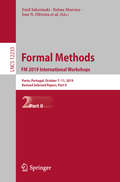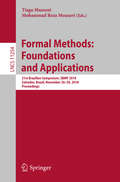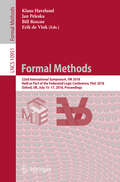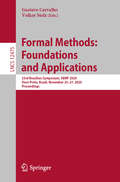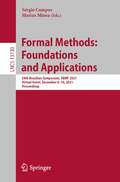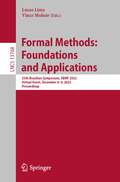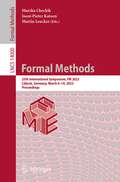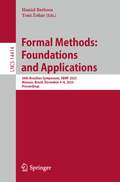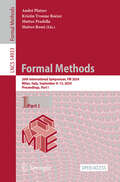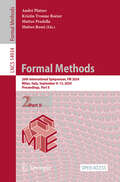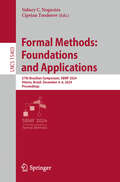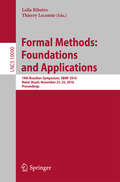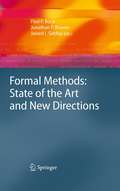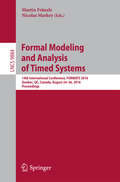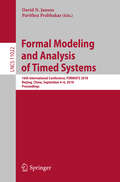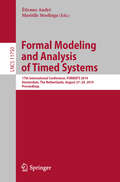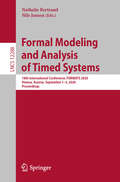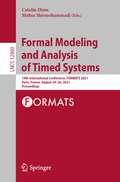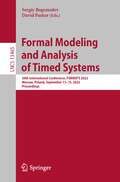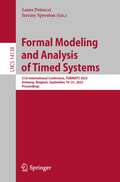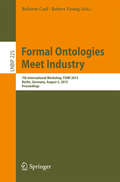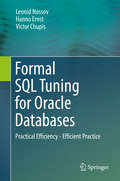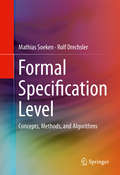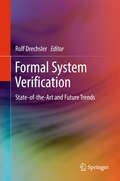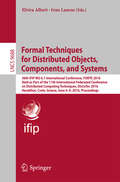- Table View
- List View
Formal Methods. FM 2019 International Workshops: Porto, Portugal, October 7–11, 2019, Revised Selected Papers, Part II (Lecture Notes in Computer Science #12233)
by Antonio Cerone Riccardo Guidotti Martin Kutrib Emil Sekerinski José N. Oliveira Brijesh Dongol Nelma Moreira Daniel Ratiu Marie Farrell Matt Luckcuck Diego Marmsoler José Campos Troy Astarte Laure Gonnord Luis Couto Pedro Monteiro David DelmasThis book constitutes the refereed proceedings of the workshops which complemented the 23rd Symposium on Formal Methods, FM 2019, held in Porto, Portugal, in October 2019. This volume presents the papers that have been accepted for the following workshops: Third Workshop on Practical Formal Verification for Software Dependability, AFFORD 2019; 8th International Symposium From Data to Models and Back, DataMod 2019; First Formal Methods for Autonomous Systems Workshop, FMAS 2019; First Workshop on Formal Methods for Blockchains, FMBC 2019; 8th International Workshop on Formal Methods for Interactive Systems, FMIS 2019; First History of Formal Methods Workshop, HFM 2019; 8th International Workshop on Numerical and Symbolic Abstract Domains, NSAD 2019; 9th International Workshop on Open Community Approaches to Education, Research and Technology, OpenCERT 2019; 17th Overture Workshop, Overture 2019; 19th Refinement Workshop, Refine 2019; First International Workshop on Reversibility in Programming, Languages, and Automata, RPLA 2019; 10th International Workshop on Static Analysis and Systems Biology, SASB 2019; and the 10th Workshop on Tools for Automatic Program Analysis, TAPAS 2019.
Formal Methods: 21st Brazilian Symposium, SBMF 2018, Salvador, Brazil, November 26–30, 2018, Proceedings (Lecture Notes in Computer Science #11254)
by Mohammad Reza Mousavi Tiago MassoniThis book constitutes the refereed proceedings of the 21st Brazilian Symposium on Formal Methods, SBMF 2018, which took place in Salvador, Brazil, in November 2018.The 16 regular papers presented in this book were carefully reviewed and selected from 30 submissions. The papers are organized in topical sections such as: techniques and methodologies; specification and modeling languages; theoretical foundations; verification and validation; experience reports regarding teaching formal methods; and applications.Chapter “TeSSLa: Temporal Stream-Based Specification Language” is available open access under a Creative Commons Attribution 4.0 International License via link.springer.com.
Formal Methods: 22nd International Symposium, FM 2018, Held as Part of the Federated Logic Conference, FloC 2018, Oxford, UK, July 15-17, 2018, Proceedings (Lecture Notes in Computer Science #10951)
by Bill Roscoe Klaus Havelund Jan Peleska Erik De VinkThis book constitutes the refereed proceedings of the 22nd International Symposium on Formal Methods, FM 2018, held in Oxford, UK, in July 2018.The 44 full papers presented together with 2 invited papers were carefully reviewed and selected from 110 submissions. They present formal methods for developing and evaluating systems. Examples include autonomous systems, robots, and cyber-physical systems in general. The papers cover a broad range of topics in the following areas: interdisciplinary formal methods; formal methods in practice; tools for formal methods; role of formal methods in software systems engineering; and theoretical foundations.
Formal Methods: 23rd Brazilian Symposium, SBMF 2020, Ouro Preto, Brazil, November 25–27, 2020, Proceedings (Lecture Notes in Computer Science #12475)
by Volker Stolz Gustavo CarvalhoThis book constitutes the refereed proceedings of the 23rd Brazilian Symposium on Formal Methods, SBMF 2020, which was supposed to take place in Ouro Preto, Brazil, in November 2020. Instead the symposium took place virtually due to the COVID-19 pandemic. The 10 regular papers presented together with 3 invited talks in this book were carefully reviewed and selected from 17 submissions. The papers are organized in topical sections such as: experience reports; models, languages and semantics; and software product lines.Chapter ‘Safety Assurance of a High Voltage Controller for an Industrial Robotic System’ is available open access under a Creative Commons Attribution 4.0 International License via link.springer.com.
Formal Methods: 24th Brazilian Symposium, SBMF 2021, Virtual Event, December 6–10, 2021, Proceedings (Lecture Notes in Computer Science #13130)
by Sérgio Campos Marius MineaThis book constitutes the refereed proceedings of the 24rd Brazilian Symposium on Formal Methods, SBMF 2021, which was held in December 2021. Due to COVID 19-pandemic it took place virtually. The 8 regular papers presented in this book were carefully reviewed and selected from 15 submissions. The papers detail the development, dissemination, and use of formal methods for the construction of high-quality computational systems, aiming to promote opportunities for researchers and practitioners with an interest in formal methods to discuss the recent advances in this area
Formal Methods: 25th Brazilian Symposium, SBMF 2022, Virtual Event, December 6–9, 2022, Proceedings (Lecture Notes in Computer Science #13768)
by Lucas Lima Vince MolnárThis book constitutes the refereed proceedings of the 25th Brazilian Symposium on Formal Methods, SBMF 2022, which was held virtually in December 2022. The 8 regular papers presented in this book were carefully reviewed and selected from 15 submissions. The symposium focuses on the development, dissemination, and use of formal methods for the construction of high-quality computational systems, aiming to promote opportunities for researchers and practitioners with an interest in formal methods to discuss the recent advances in this area.
Formal Methods: 25th International Symposium, FM 2023, Lübeck, Germany, March 6–10, 2023, Proceedings (Lecture Notes in Computer Science #14000)
by Martin Leucker Marsha Chechik Joost-Pieter KatoenThis book constitutes the refereed proceedings of the 25th International Symposium on Formal Methods, FM 2023, which took place in Lübeck, Germany, in March 2023. The 26 full paper, 2 short papers included in this book were carefully reviewed and selected rom 95 submissions. They have been organized in topical sections as follows: SAT/SMT; Verification; Quantitative Verification; Concurrency and Memory Models; Formal Methods in AI; Safety and Reliability. The proceedings also contain 3 keynote talks and 7 papers from the industry day.
Formal Methods: 26th Brazilian Symposium, SBMF 2023, Manaus, Brazil, December 4–8, 2023, Proceedings (Lecture Notes in Computer Science #14414)
by Haniel Barbosa Yoni ZoharThis book constitutes the refereed proceedings of the 26th Brazilian Symposium on Formal Methods, SBMF 2023, held in Manaus, Brazil, during December 4-8, 2023.The 7 full papers and 2 short papers presented in this book were carefully reviewed and selected from 16 submissions.The papers are divided into the following topical sections: specification and modeling languages; testing; and verification and validation.
Formal Methods: 26th International Symposium, FM 2024, Milan, Italy, September 9–13, 2024, Proceedings, Part I (Lecture Notes in Computer Science #14933)
by Matteo Rossi André Platzer Kristin Yvonne Rozier Matteo PradellaThe open access book set LNCS 14933 + 14934 constitutes the refereed proceedings of the 26th International Symposium on Formal Methods, FM 2024, which took place in Milan, Italy, in September 2024. The 51 full and 4 short papers included in these proceedings were carefully reviewed and selected from 219 submissions. They also include 2 invited talks in full paper length and 10 tutorial papers. The contributions were organized in topical sections as follows: Part I: Invited papers; fundamentals of formal verification; foundations; learn and repair; programming languages.- logic and automata; Part II: Tools and case studies; embedded systems track; industry day track; tutorial papers.
Formal Methods: 26th International Symposium, FM 2024, Milan, Italy, September 9–13, 2024, Proceedings, Part II (Lecture Notes in Computer Science #14934)
by Matteo Rossi Kristin Yvonne Rozier Andre Platzer Matteo PradellaThe open access book set LNCS 14933 + 14934 constitutes the refereed proceedings of the 26th International Symposium on Formal Methods, FM 2024, which took place in Milan, Italy, in September 2024. The 51 full and 4 short papers included in these proceedings were carefully reviewed and selected from 219 submissions. They also include 2 invited talks in full paper length and 10 tutorial papers. The contributions were organized in topical sections as follows: Part I: Invited papers; fundamentals of formal verification; foundations; learn and repair; programming languages.- logic and automata; Part II: Tools and case studies; embedded systems track; industry day track; tutorial papers.
Formal Methods: 27th Brazilian Symposium, SBMF 2024, Vitória, Brazil, December 4–6, 2024, Proceedings (Lecture Notes in Computer Science #15403)
by Sidney C. Nogueira Ciprian TeodorovThis book constitutes the refereed proceedings of the 27th Brazilian Symposium on Formal Methods: Foundations and Applications, SBMF 2024, held in Vitória, Brazil, during December 4–6, 2024. The 8 full papers and 4 short papers included in this book were carefully reviewed and selected from 18 submissions. They were organized in topical sections as follows: Formal Analysis and Verification in Temporal and Symbolic Systems; Formal Semantics and Verification of UML Models; Formal Verification and Proof Techniques in Algorithms and Logics; and Formal Methods for Security and Privacy.
Formal Methods: Foundations and Applications
by Thierry Lecomte Leila RibeiroThis book constitutes the refereed proceedings of the 19th Brazilian Symposium on Formal Methods, SBMF 2016, which took place in Natal, Brazil, in November 2016. The 12 papers presented together with two invited talks were carefully reviewed and selected from 22 submissions. They are organized in the following topical sections: analysis and verification; modeling and logic; and model checking.
Formal Methods: State of the Art and New Directions
by Jawed Siddiqi Paul Boca Jonathan P. BowenThe last decade has witnessed a modest but sustained increase in researching and applying formal methods. A number of well cited success stories are now available and provide strong evidence that formal methods can be effective and deployed in industrial-scale applications. Through fundamental contributions from leading researchers, this book provides further evidence of the use of formal methods in the areas of requirements, design, modelling and implementation, verification and validation. The self-contained chapters are views from experts in these areas, providing readers with rich background information and a diverse breadth of specialist material. This authoritative collection of views provides a snapshot of the field and will be of considerable interest to researchers and professionals seeking a perspective on fundamental underpinnings of formal methods and current hot topics in the field. The following website www.fmsand.info is associated with the book.
Formal Modeling and Analysis of Timed Systems
by Martin Fränzle Nicolas MarkeyThis book constitutes the refereed proceedings of the 14th International Conference on Formal Modeling and Analysis of Timed Systems, FORMATS 2016, held in Quebec, QC, Canada, in August 2016. The 14 papers presented in this volume were carefully reviewed and selected from 32 initial submissions. They are organized in topical sections entitled: modeling timed phenomena; stochasticity and hybrid control; real-time verification and synthesis; workload analysis.
Formal Modeling and Analysis of Timed Systems: 16th International Conference, FORMATS 2018, Beijing, China, September 4–6, 2018, Proceedings (Lecture Notes in Computer Science #11022)
by Pavithra Prabhakar David N. JansenThis book constitutes the refereed proceedings of the 16th International Conference on Formal Modeling and Analysis of Timed Systems, FORMATS 2018, held in Beijing, China, in September 2018. The 14 papers presented in this volume were carefully reviewed and selected from 29 submissions. The papers are organized in the following topical sections: invited papers, temporal logics, distributed timed systems, behavioral equivalences, timed words, and continuous dynamical systems. The aim of FORMATS is to promote the study of fundamental and practical aspects of timed systems, and to bring together researchers from different disciplines that share interests in modeling and analysis of timed systems and, as a generalization, hybrid systems.
Formal Modeling and Analysis of Timed Systems: 17th International Conference, FORMATS 2019, Amsterdam, The Netherlands, August 27–29, 2019, Proceedings (Lecture Notes in Computer Science #11750)
by Mariëlle Stoelinga Étienne AndréThis book constitutes the refereed proceedings of the 17th International Conference on Formal Modeling and Analysis of Timed Systems, FORMATS 2019, held in Amsterdam, The Netherlands, in August 2019.The 15 full papers and 2 short papers presented in this volume were carefully reviewed and selected from 42 submissions. The papers are organized in the following topical sections: special session on data-driven and stochastic approaches to real-time, including monitoring and Big Data; timed systems; linear and non-linear systems; timed automata; special session on timed systems and probabilities.
Formal Modeling and Analysis of Timed Systems: 18th International Conference, FORMATS 2020, Vienna, Austria, September 1–3, 2020, Proceedings (Lecture Notes in Computer Science #12288)
by Nathalie Bertrand Nils JansenThis book constitutes the refereed proceedings of the 18th International Conference on Formal Modeling and Analysis of Timed Systems, FORMATS 2020, held in Vienna, Austria, in September 2020. The 16 full papers and 2 short papers presented in this volume were carefully reviewed and selected from 42 submissions. The papers focus on topics such as foundations and semantics, methods and tools, techniques, algorithms, data structures, and software tools for analyzing timed systems and resolving temporal constraints.Due to the Corona pandemic this conference was held as a virtual event.
Formal Modeling and Analysis of Timed Systems: 19th International Conference, FORMATS 2021, Paris, France, August 24–26, 2021, Proceedings (Lecture Notes in Computer Science #12860)
by Catalin Dima Mahsa ShirmohammadiThis book constitutes the refereed proceedings of the 19th International Conference on Formal Modeling and Analysis of Timed Systems, FORMATS 2021, held in Paris, France, in August 2021.The 8 full papers that were carefully reviewed and selected from 19 submissions are presented in this volume with 2 invited talks. The papers focus on topics such as probabilistic computation, logic and verification, robotic planning, complexity of timed pattern matching, safety violations in real-time systems, modal and temporal logics, and others.
Formal Modeling and Analysis of Timed Systems: 20th International Conference, FORMATS 2022, Warsaw, Poland, September 13–15, 2022, Proceedings (Lecture Notes in Computer Science #13465)
by David Parker Sergiy BogomolovThis book constitutes the refereed proceedings of the 20th International Conference on Formal Modeling and Analysis of Timed Systems, FORMATS 2022, held in Warsaw, Poland, in September 2022. The 12 full papers together with 2 short papers that were carefully reviewed and selected from 30 submissions are presented in this volume with 3 full-length papers associated with invited/anniversary talks. The papers focus on topics such as modelling, design and analysis of timed computational systems. The conference aims in real-time issues in hardware design, performance analysis, real-time software, scheduling, semantics and verification of real-timed, hybrid and probabilistic systems.
Formal Modeling and Analysis of Timed Systems: 21st International Conference, FORMATS 2023, Antwerp, Belgium, September 19–21, 2023, Proceedings (Lecture Notes in Computer Science #14138)
by Laure Petrucci Jeremy SprostonThis book constitutes the refereed proceedings of the 21st International Conference on Formal Modeling and Analysis of Timed Systems, FORMATS 2023, held in Antwerp, Belgium, in September 2023. The 9 full papers presented in this book were carefully reviewed and selected from 21 submissions. The proceedings also contain one invited paper in full paper length. The papers deal with real-time issues in hardware design, performance analysis, real-time software, scheduling, semantics, and verification of real-timed, hybrid, and probabilistic systems.
Formal Ontologies Meet Industry
by Robert Young Roberta CuelThis book constitutes the proceedings of the 7th International Formal Ontologies Meet Industries Workshop held in Berlin, Germany, in August 2015. The 11 full research papers accepted for FOMI 2015 were selected from 18 submissions. The papers focus on theoretical studies of formal ontologies committed to provide a sound basis for industrial applications and to allow formal representation of corporate knowledge, and on business experiences in case studies that single out concrete problems and possible solutions in the creation and deployment of formal ontologies. Overall, they provide valuable insights into the current state of progress in supporting industrial information and knowledge sharing through the development of formal ontologies.
Formal SQL Tuning for Oracle Databases
by Leonid Nossov Hanno Ernst Victor ChupisThe target of SQL tuning is the improvement of the existing execution plan. The authors discuss the removal of brakes in the execution plan. Such "brakes" or bottlenecks can be recognized by a formal analysis of the execution plan. For this purpose no data model knowledge is needed. This is especially beneficial for database administrators because they are usually not or insufficiently familiar with the data model. The book presents numerous practical examples with this method.
Formal Specification Level
by Rolf Drechsler Mathias SoekenThis book introduces a new level of abstraction that closes the gap between the textual specification of embedded systems and the executable model at the Electronic System Level (ESL). Readers will be enabled to operate at this new, Formal Specification Level (FSL), using models which not only allow significant verification tasks in this early stage of the design flow, but also can be extracted semi-automatically from the textual specification in an interactive manner. The authors explain how to use these verification tasks to check conceptual properties, e. g. whether requirements are in conflict, as well as dynamic behavior, in terms of execution traces.
Formal System Verification
by Rolf DrechslerThis book presents the lecture notes of the 1st Summer School on Methods and Tools for the Design of Digital Systems, 2015, held in Bremen, Germany. The topic of the summer school was devoted to modeling and verification of cyber-physical systems. This covers several aspects of the field, including hybrid systems and model checking, as well as applications in robotics and aerospace systems. The main chapters have been written by leading scientists, who present their field of research, each providing references to introductory material as well as latest scientific advances and future research directions. This is complemented by short papers submitted by the participating PhD students.
Formal Techniques for Distributed Objects, Components, and Systems
by Elvira Albert Ivan LaneseThis book constitutes the proceedings of the 36th IFIP WG 6. 1 International Conference on Formal Techniques for Distributed Objects, Components, and Systems, FORTE 2016, held in Heraklion, Crete, Greece, in June 2016, as part of the 11th International Federated Conference on Distributed Computing Techniques, DisCoTec 2016. The 18 revised full papers presented were carefully reviewed and selected from 44 submissions. The papers present a wide range of topics on distributed computing models and formal specification, testing, and verification methods.
